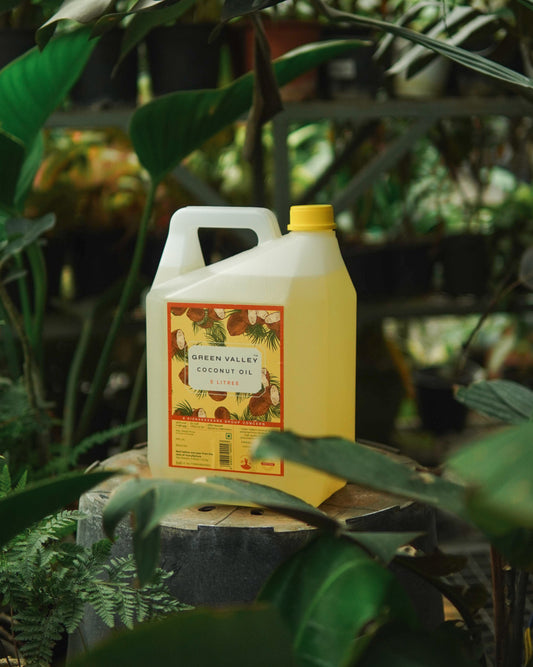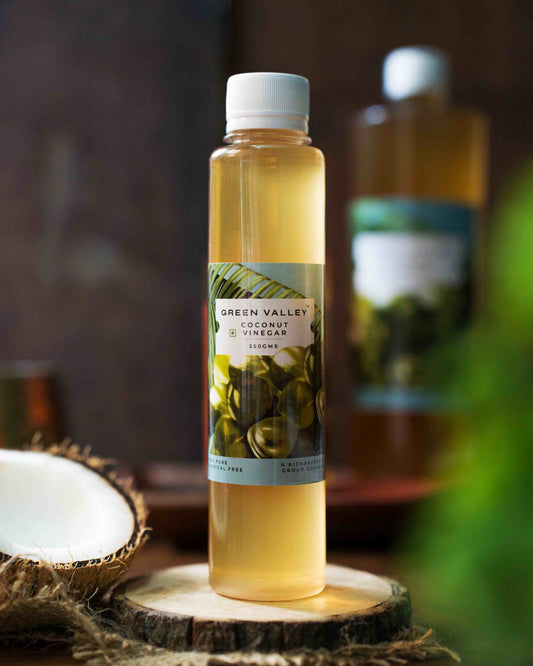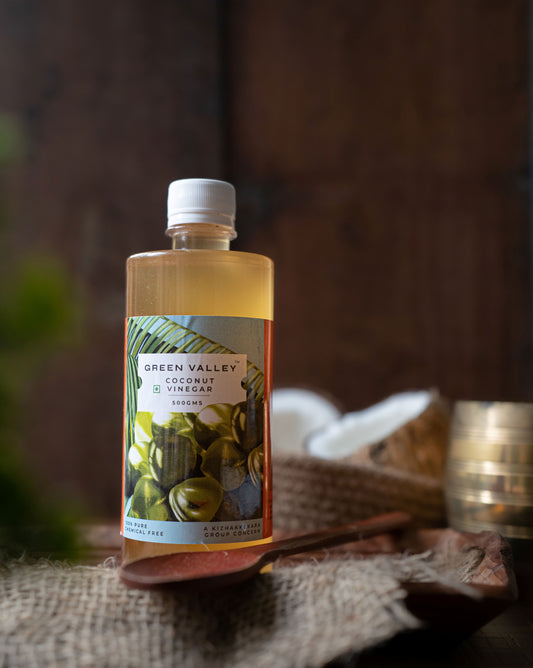Most of us must have had our first introduction to vinegar as “the untouchable bottle of transparent liquid”. Our parents marked it off as a hazardous substance, only to come out of the top shelf in rare instances. You see them drizzle this untouchable liquid on curries or soups or pickles, in mere teaspoons of quantity.
But then there are days when bottles and bottles of this liquid are used up and the piercing, pungent sting of this odd liquid was in escapable. Yes, the cleaning days.
Over the years, we have seen the roles of vinegar evolving through various use cases. This cooking agent found different purposes in its short-lived life - as a cleaning agent, an ingredient for DIY beauty hacks, and finally a lifestyle essential in the modern era.
But it wasn’t without a good makeover. The synthetic transparent vinegar was shoved aside by its new shiny sibling - apple cider, balsamic, and now coconut.
But are any of them better than their ancestors?
Today let’s put Coconut Vinegar under the microscope - what’s good, what’s not and moreover what is it?
What Exactly Is Coconut Vinegar?
Let’s start with the basics. Coconut vinegar is a natural product derived from two main sources: the sap of the coconut tree’s blossoms (also called “toddy”) or the water from mature coconuts. While it may seem like a relatively new player in this modern world, coconut vinegar has been a staple ingredient in traditional Asian and Southeast Asian cuisines for centuries.
The magic happens through a natural fermentation process where the sap or coconut water turns into vinegar, retaining a whole array of nutrients and beneficial compounds. It has a cloudy brown appearance and a milder, slightly sweet flavour compared to the sharp tang of white vinegar, making it a versatile addition to both your kitchen and self-care routine.
What’s In It?
Before we go any further, let’s break down what makes coconut vinegar so special in the nutrient department. Unlike heavily processed vinegars, coconut vinegar undergoes minimal processing, which means it retains many of its beneficial nutrients. Here is a brief overview of what you will receive:
- Minerals Galore: Coconut vinegar is rich in minerals such as potassium, magnesium, iron, and zinc.
- Vitamins B and C: These vitamins are important for energy metabolism, immune support, and skin health.
- Amino Acids: With all nine essential amino acids, coconut vinegar provides building blocks for protein synthesis and helps maintain overall health.
- Probiotics: Thanks to the natural fermentation process, coconut vinegar contains probiotics—those friendly bacteria that promote a happy gut and better digestion.
Health Benefits Of Coconut Vinegar
"But hey, I already have all the nutrients I could ever need in pills from my nutritionist."
This little tangy liquid is much beyond its nutrient profile. Here are some of the standout health benefits it offers:
1. Improves Digestion And Gut Health
Coconut vinegar is a natural source of probiotics, which can help maintain a balanced gut microbiome. This can translate into better digestion, reduced bloating, and improved nutrient absorption. So, if your gut feels like it’s been playing the drums after every meal, a little coconut vinegar might bring harmony to the chaos.
2. Regulates Blood Sugar Levels
Research suggests that vinegar, in general, can slow down the absorption of sugars into the bloodstream, potentially reducing blood sugar spikes after meals. Coconut vinegar shares this trait, making it a good option for people who need to keep their blood sugar levels in check—just don’t expect it to replace any medical treatments.
3. Supports Weight Management
No, it won’t magically melt away the 3 am pizza binge, but coconut vinegar might offer some assistance with weight management. Like other types of vinegar, it can increase satiety, making you feel full for longer and potentially reducing overall calorie intake. Mix a spoonful of water before meals if you’re curious—just remember, it’s not a substitute for balanced eating and exercise.
4. Antibacterial And Antimicrobial Properties
Coconut vinegar’s acetic acid content gives it antibacterial and antimicrobial qualities. It can help fight off harmful bacteria, whether you’re using it to clean surfaces, wash produce, or soothe minor skin irritations. But don’t go drenching yourself in it for every little scrape—dilution is key, my friend.
5. Boosts Immunity
Packed with antioxidants and beneficial enzymes, coconut vinegar can give your immune system a gentle nudge in the right direction. Regular consumption may help fend off free radicals, reducing oxidative stress and supporting overall health.
6. Promotes Heart Health
Thanks to its high potassium content, coconut vinegar can contribute to heart health by maintaining proper blood pressure levels. Potassium helps regulate fluid balance, reduce the effects of sodium, and keep that ticker in good shape.
7. Improves Skin And Scalp Health
This isn’t just about sipping coconut vinegar; you can also slather it on! Diluted coconut vinegar works as a natural toner that helps balance the skin’s pH, tighten pores, and reduce redness. For those with itchy scalps or dandruff, a vinegar rinse can do wonders. But, as always, do a patch test before turning your head into a science experiment.
How To Use Coconut Vinegar
Now that we’ve covered why you should give coconut vinegar a chance, let’s talk about how to incorporate it into your life.
1. Cooking And Dressing
Coconut vinegar’s mild, tangy taste makes it perfect for salad dressings, marinades, and dipping sauces. Add a splash to stir-fries, soups, or anywhere you’d normally use vinegar for an added nutritional kick.
2. Diluted As A Drink
Feeling brave? Mix one to two tablespoons of coconut vinegar with a glass of water and a dash of honey. Drink it before meals for a potential digestive and appetite-suppressing boost. Or, you know, to prove you can handle the tang.
3. DIY Skincare
Mix coconut vinegar with water and apply as a toner to your skin, or create a hair rinse for a natural shine. Remember to always dilute it properly to avoid any harsh reactions—because your skin needs love, not a vinegar burn.
4. Cleaning Solution
Mix coconut vinegar with water to create a natural, chemical-free cleaning solution for your home. It can help remove dirt, grime, and bacteria from surfaces, making it a great eco-friendly option.
Does It Have Any Downsides?
As with anything, moderation is key. Overdoing it with coconut vinegar (especially if consumed undiluted) could lead to potential side effects like tooth enamel erosion, throat irritation, or digestive discomfort. If you have any underlying health conditions, it’s always a good idea to check with your healthcare provider before making it a daily ritual.
Coconut vinegar is a nutrient-packed, multitasking powerhouse that offers a range of health benefits, from gut health and blood sugar regulation to skin and heart health. Whether you’re sipping it, cooking with it, or slapping it on your face (please dilute!), this tropical elixir has earned a rightful spot in your pantry and beyond.
So next time you’re contemplating a vinegar purchase, give coconut vinegar a shot. It might just surprise you with how versatile, flavorful, and beneficial it can be—without any of the vinegar aisle drama.








